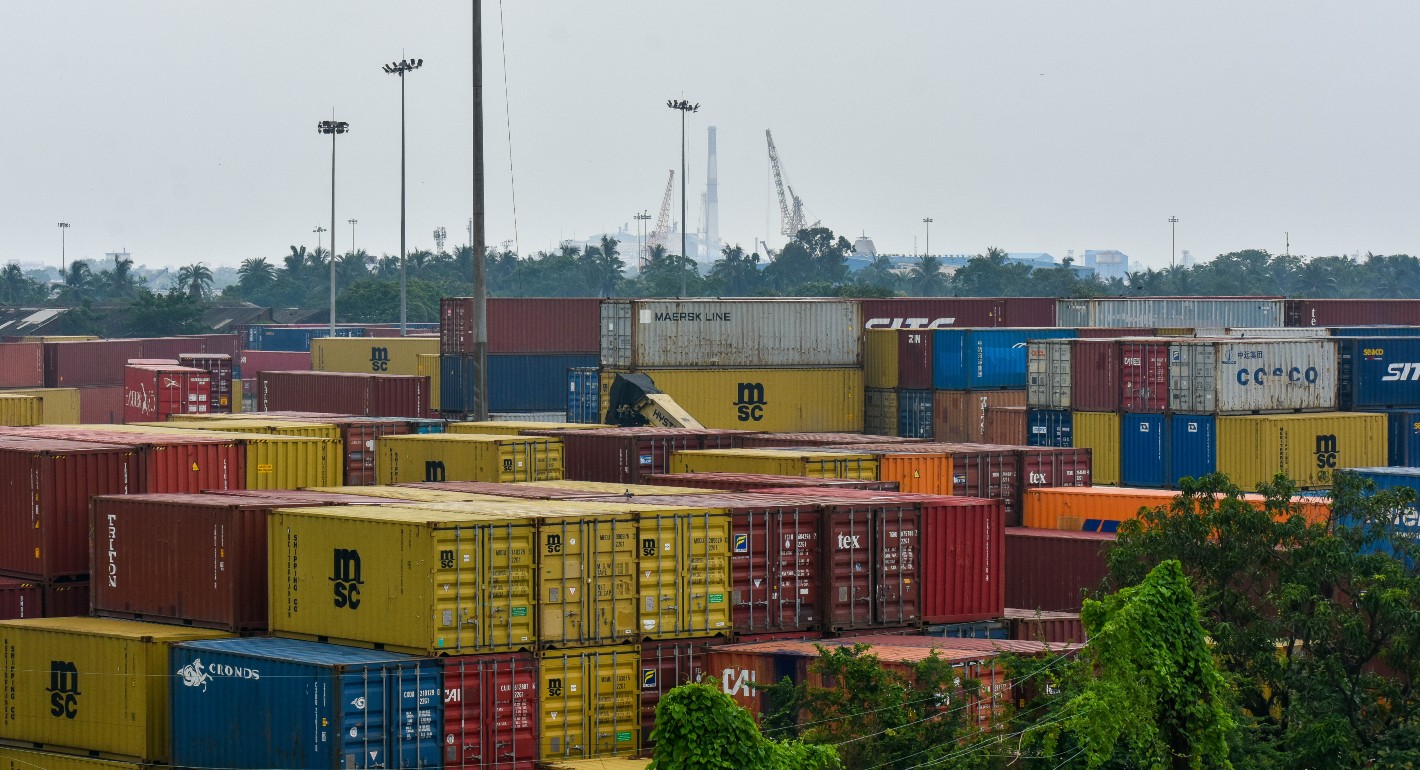Mr. Husain Haqqani, Ashley J. Tellis
{
"authors": [
"Husain Haqqani"
],
"type": "legacyinthemedia",
"centerAffiliationAll": "dc",
"centers": [
"Carnegie Endowment for International Peace"
],
"collections": [],
"englishNewsletterAll": "",
"nonEnglishNewsletterAll": "",
"primaryCenter": "Carnegie Endowment for International Peace",
"programAffiliation": "russia",
"programs": [
"Russia and Eurasia"
],
"projects": [],
"regions": [
"South Asia",
"India",
"Pakistan"
],
"topics": [
"Nuclear Policy"
]
}
REQUIRED IMAGE
No Room for Hardliners
Source: Carnegie
Originally appeared in The Indian
Express, Gulf News, and
The Nation (Pakistan), May 7,
2003
The recent thaw in India-Pakistan relations comes after a particularly difficult
phase that began with the terrorist attack on India’s Parliament in December
2001. The two countries will now exchange ambassadors (or High Commissioners,
in the vocabulary of the British Commonwealth) and restore civil aviation links.
Prime Minister Atal Behari Vajpayee has described this as his third and last
attempt at seeking lasting peace with Pakistan, a reference to his February
1999 Lahore visit and General Pervez Musharraf’s trip to Agra in July 2001,
neither of which led to a sustained peace process. On both occasions, the mere
event of high-level dialogue created euphoria that was followed by disappointment.
The Lahore process was interrupted by the Kargil misadventure while the Agra
talks did not result even in a joint declaration. This time, too, celebrations
of a thaw would be premature unless both sides have learnt some lessons from
the past.
Bringing about peace between two sides with a huge gap in their positions is never easy. The first stage is usually to create trust and confidence followed by agreement over the elements of a final settlement. Building trust itself can take a long time and challenges continue to arise even after agreements and declarations have been signed. In the Israeli-Palestinian process, for example, the two sides have come a long way from their original positions. The Palestinians now accept Israel’s right to exist, something they did not acknowledge for several decades. Israel, on the other hand, now accepts that the Palestinians are more than refugees to be resettled, a national group deserving of a homeland. But the two sides still do not trust each other and within each camp hardliners still insist on refusing to recognise the other’s rights. And these hardliners often have the ability to act as spoilers in the arduous peace process.
Although a two-state solution in Israel-Palestine is accepted as the desirable final outcome, numerous plans and roadmaps have had to be formulated and subsequently revised or set aside. In the case of India and Pakistan, there is no agreement or international consensus on what an acceptable final outcome might be. If resolving a conflict is difficult even after general recognition of the key elements of a settlement, one should not underestimate the complexity of dialogue between two sides that have never gone beyond their stated positions in five decades.
The key to a sustained and comprehensive peace process is political will on both sides. International actors, such as the United States, can facilitate dialogue and nudge the leaders of India and Pakistan to the negotiating table. But whether dialogue is used for point scoring, as has been the case in the past in South Asia, or for actually overcoming differences is up to the two parties. Professor Lincoln P. Bloomfield observed last year, ‘‘If the irony and the tragedy of the Israeli-Palestinian conflict is that both sides are right, catastrophe could befall South Asia because both sides are wrong — India for denying the population of Kashmir genuine self-determination, Pakistan for fostering terrorism, and both for blustering when prudence is called for’’. Expecting Islamabad and New Delhi to overcome their belief in the absolute righteousness of their respective positions might be too much at this stage. But the two sides can try and control the bluster, which has run previous peace efforts aground.
In India, the bluster usually starts out with the hardliners of the Hindutva brigade, which portrays Pakistan and Muslims as the sources of all evil and refuses to recognise the merit of India-Pakistan dialogue. The Hindu Mahasabha attacked Gandhi for advocating an end to communal riots at the time of partition in 1947 and for demanding that Pakistan be given its share of undivided India’s assets. The Bharatiya Jana Sangh was critical of the Indus Waters Treaty between Field Marshal Ayub Khan and Prime Minister Jawaharlal Nehru. Indira Gandhi came under attack for the Simla accord, after Pakistan’s defeat in the 1971 Bangladesh war. Now Prime Minister Vajpayee is being criticised by the RSS for backing away from coercive diplomacy that was not going anywhere anyway. For the votaries of Hindutva, Pakistan is not a neighbour to be engaged but rather an enemy to be defeated or eliminated. Real or perceived historic grievances and the need to settle scores, rather than contemporary realities of international relations, dictate this extremist mindset. The misfortune is that the extremists often end up setting the terms of discourse, swaying even the moderates in the direction of finding ways to punish the opponent instead of figuring out how to resolve the outstanding issues.
On the Pakistani side, the Islamists and ultra-nationalists have always been ready to hurl the accusation of treason at anyone seeking rapprochement with India. In 1951, Prime Minister Liaquat Ali Khan’s patriotism was questioned and since then the pattern has endured. The Pakistani people are often fed a diet of myths about the country’s military capability, which makes potential peacemakers seem weaklings to those awaiting a military victory. Ayub Khan was ridiculed for having squandered the mythic battlefield victory of 1965 during talks at Tashkent the next year. Zulfikar Ali Bhutto was accused of selling out Kashmir at Simla after the Bangladesh war of 1971. Benazir Bhutto and Nawaz Sharif were also charged with conspiracies for their initiatives to normalise relations with India. One hopes that similar accusations will not be hurled at a peace process initiated by a serving general, acting as President of Pakistan in full uniform.
Kashmir is the most difficult, though by no means the only, issue in any round of India-Pakistan negotiations, presuming the current thaw will lead to a sustained dialogue. I commend to all potential negotiators, from both sides, Professor Robert G. Wirsing’s new book Kashmir in the Shadow of Nuclear War published by M.E. Sharpe in New York and London. It is one of the best books on the subject, attempting to go beyond the historical narrative to address the contemporary political and strategic issues.
Professor Wirsing is a well-known South Asia expert who has managed so far to avoid being labelled pro-India or pro-Pakistan even though he has written on the region extensively. Currently at the Asia-Pacific Centre for Security Studies in Honolulu, Hawaii, he has lived and worked in both India and Pakistan and is familiar with the attitudes and arguments of both sides. His book examines the India-Pakistan conflict in all its dimensions, beginning with the problem of regional rivalry and ending with the problem of conflict resolution. Professor Wirsing analyses the Kashmir dispute as a problem of religious identity and reviews the prospect of global intervention or ‘‘internationalisation’’. He advocates the postponement of the quest for the final resolution of the Kashmir conundrum while simultaneously upgrading it in terms of international attention. ‘‘For the most part,’’ he writes, ‘‘the Kashmir dispute is best understood less as a territorial or a moral issue than as a political and strategic — indeed a macropolitical and macrostrategic — issue. One can hardly imagine a solution to it, moreover, which does not favour one political or strategic outcome (and one side) over another. This is simply to say that there is not presently at hand a neutral or ‘win-win’ remedy.’’
Professor Wirsing feels that sustained cooperative official interaction, rather
than focus on an immediate and final resolution of the Kashmir issue is the
better way forward in South Asia. One cannot but be moved by his impassioned
plea, ‘‘Two great nations, India and Pakistan, face one another today
in a region shadowed menacingly both by terrorism and the onrushing nuclear
revolution. Having far more in common with one another than either would ever
admit, they enter upon the turbulent political terrain of the twenty-first century
bent with a burden of fear and distrust that neither, whether acting alone or
even in company with its hostile neighbour, is fully empowered to remove. If
it is not soon removed, however, or at least substantially reduced, the progress
made by these two countries in this new century will not escape the extraordinarily
heavy economic, political and social penalties both paid in the last. To lend
a determined international hand to the removal or reduction of this burden seems,
in the end, an imperative of responsible global statesmanship.’’
About the Author

Former Visiting Scholar
- India and Pakistan: Is Peace Real This Time?: A Conversation between Husain Haqqani and Ashley J. TellisReport
- America's New Alliance with Pakistan: Avoiding the Traps of the PastOther
Mr. Husain Haqqani
Recent Work
Carnegie does not take institutional positions on public policy issues; the views represented herein are those of the author(s) and do not necessarily reflect the views of Carnegie, its staff, or its trustees.
More Work from Carnegie Endowment for International Peace
- Modernizing South Asia’s Borders Through Data-Driven ResearchArticle
Cargo time release studies offer a path to greater economic gains and higher trust between neighboring countries.
Nikita Singla
- Europe on Iran: Gone with the WindCommentary
Europe’s reaction to the war in Iran has been disunited and meek, a far cry from its previously leading role in diplomacy with Tehran. To avoid being condemned to the sidelines while escalation continues, Brussels needs to stand up for international law.
Pierre Vimont
- India Signs the Pax Silica—A Counter to Pax Sinica?Commentary
On the last day of the India AI Impact Summit, India signed Pax Silica, a U.S.-led declaration seemingly focused on semiconductors. While India’s accession to the same was not entirely unforeseen, becoming a signatory nation this quickly was not on the cards either.
Konark Bhandari
- Indian Americans Still Lean Left. Just Not as Reliably.Commentary
New data from the 2026 Indian American Attitudes Survey show that Democratic support has not fully rebounded from 2020.
- +1
Sumitra Badrinathan, Devesh Kapur, Andy Robaina, …
- Macron Makes France a Great Middle PowerCommentary
France has stopped clinging to notions of being a great power and is embracing the middle power moment. But Emmanuel Macron has his work cut out if he is to secure his country’s global standing before his term in office ends.
Rym Momtaz










